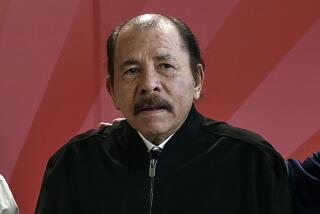Managua’s Failing Economy
- Share via
A secret report prepared for the Sandinista government confirms a widely held suspicion that the Nicaraguan economy is in bad shape and getting worse. While the Bush Administration may take some satisfaction from that, U.S. officials should also seize the opportunity for a more constructive relationship between Washington and Managua.
The confidential study was prepared by an international team of experts for President Daniel Ortega, who used the findings on a trip to Europe last month seeking foreign assistance for his war-torn nation. A key conclusion is that Nicaragua’s once-thriving economy has shrunk by one- third since dictator Anastasio Somoza was overthrown in 1979. In at least some statistical categories, Nicaragua is now the poorest Western Hemisphere nation, below poverty-stricken Haiti.
The report, made public recently by the New York Times, does not try to assess blame for Nicaragua’s economic devastation. The Sandinistas blame their problems on Somoza, who looted the national treasury before fleeing the country, and on the United States, which has supported both a war and a trade embargo against them. Sandinista opponents claim they created their own mess by driving the best of the professional class out of the country and relying, instead, on the advice and assistance of Communist allies like Cuba and the Soviet Union, economies hardly worth emulating.
But the report is forthright in setting out the difficult steps that must be taken if the downward trend is to be reversed. Among them are a drastic cut in military spending and a renewed emphasis on private sector production. Those two proposals, in particular, should interest U.S. policy-makers, for they deal with Washington’s two primary concerns about Nicaragua. A cutback in military spending would mean less Sandinista reliance on the Soviet Bloc, which can provide weaponry far more efficiently than it can provide food and other consumer goods. And a revived private sector would be a political counterbalance to the Sandinistas as they stumble about trying to turn Nicaragua into a one-party socialist state.
As the preeminent economic power in the Western Hemisphere, the United States has always been the most logical place for Nicaragua to sell its goods and find investors. Even a hostile regime there can be swayed more easily by economic incentives than by military threats. Now that former President Reagan’s unshakable hatred of the Sandinistas does not confine U.S. policy in Nicaragua to the stick, President Bush should try the carrot, using economic incentives like an end to the trade embargo, to improve relations.
More to Read
Sign up for Essential California
The most important California stories and recommendations in your inbox every morning.
You may occasionally receive promotional content from the Los Angeles Times.












